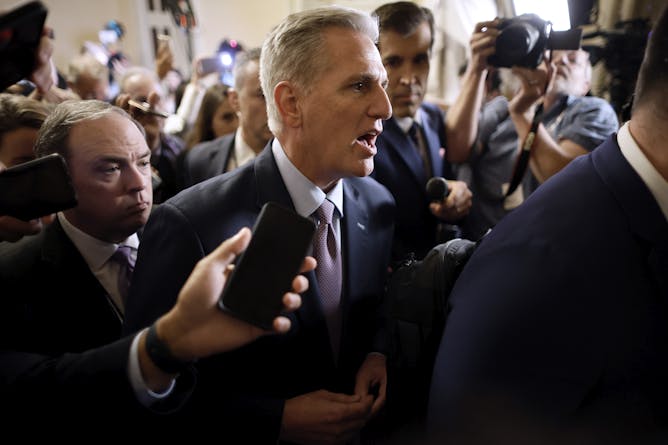|
Happy Sunday − and welcome to the best of The Conversation. Here are a few of our recently published stories:
I’m a huge fan of “The West Wing” for its interesting characters, strong acting, fascinating storylines and clever dialogue. And I’m generally quick to spot parallels between real life and the show’s plot – political and otherwise – and there has been a flurry of them this past week.
One example was Tuesday's top story about the importance of basic science to discovery, in reference to a Nobel Prize in medicine going to mRNA research. The newsletter introduction that health and biomedicine editor Vivian Lam wrote for us, which noted scientists often do basic research without a particular application in mind, seemed straight from “The West Wing,” Season 3, when Sam Seaborn tries to secure funding for a superconducting supercollider. The character struggles to articulate what benefit the technology would have, when a physicist he’s doing a favor for cites the discovery of penicillin, the X-ray and electrons. “That’s what this is used for,”
Sam declares. “It’s for discovery.”
One parallel I was expecting that didn’t materialize was the government shutdown. In Season 5, as the U.S. inches toward a budget deadline, President Bartlet refuses to agree with Speaker of the House Haffley to back a continuing resolution that would have slashed spending. “Shut it down,” Bartlet says, prompting a shutdown that lasted several days. In real life, that didn’t happen, as House Speaker Kevin McCarthy at the last minute offered a continuing resolution with none of the deep spending cuts a small faction of his party had sought. All but one Democrat joined with most Republicans to keep the government funded until around Thanksgiving. What happened next carried all the drama, colorful characters and surprise of an Aaron Sorkin screenplay: Right-wing Republicans revolted and triggered the vote that cost McCarthy his job.
In an analysis of the news, Boise State University political scientist Charles R. Hunt wrote that McCarthy’s ouster reflects the negative partisanship that pervades U.S. politics today – perhaps even more than what President Bartlet had to contend with.
Later this week, we'll bring you stories on the outbreak of violence in the Middle East, including a comparison of Hamas' attack on Israel to the 1973 Yom Kippur War, and an analysis on how Iran is poised to benefit in the aftermath.
|

Kevin McCarthy, just before he was ousted as speaker of the House.
Chip Somodevilla/Getty Images
Charles R. Hunt, Boise State University
Long gridlocked by fighting between the two major political parties, the US House is now split by conflict within the GOP, thanks in part to redistricting practices that boost extremism.
|
|
|
-
Zoie Magri, Tufts University
Your cells die to keep you alive. Cell death does everything from fighting cancer cells and pathogens to forming your fingers and toes.
-
Karyn Amira, College of Charleston
Republicans Mike Pence and Mitt Romney both spoke recently about the conservative ideals that animate their politics − and which Donald Trump has violated. Do voters care?
-
Jason C. Mueller, Kennesaw State University
Thirty years after the Battle of Mogadishu, the US continues waging war in Somalia, with little public knowledge, scrutiny or constructive results.
-
Ronald Suny, University of Michigan
The collapse of the self-proclaimed republic ushers in a new reality in the South Caucasus. For Armenia, the first concern is how to accommodate the needs of 100,000-plus refugees.
|
|

Basic research often involves lab work that won’t be appreciated until decades down the line.
Sebastian Condrea/Moment via Getty Images
André O. Hudson, Rochester Institute of Technology
The winners of the 2023 Nobel Prize in physiology or medicine made a discovery that helped create the COVID-19 vaccines. They couldn’t have anticipated the tremendous impact of their findings.
|
|
|
-
Edmund S. Higgins, Medical University of South Carolina
Change in the brain usually comes with plenty of effort over time. Neuroscientists are working to understand how psychedelic drugs provide a shortcut that seems to rely on existing brain systems.
-
Andrew Maynard, Arizona State University
Quantum dots are a prime example of the way nanotechnology engineers materials at an atomic scale.
-
Glenn Davis Stone, Sweet Briar College
Did the Green Revolution, which brought high-tech agriculture to developing nations in the 1960s, prevent famine? Recent research takes a much more skeptical view.
-
Marick Masters, Wayne State University
The companies are making more generous offers, and the union is commanding support from the general public and the president of the United States.
|
|
|
|